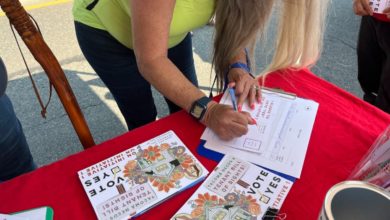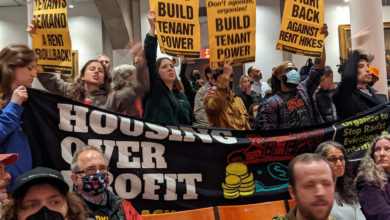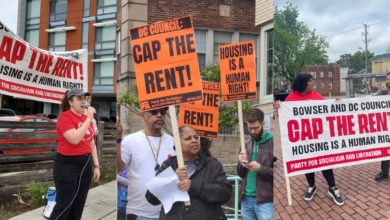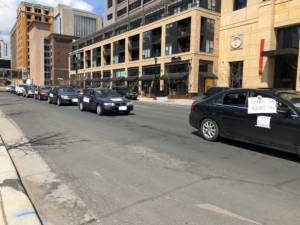
From Los Angeles to San Francisco to Chicago to New York and more than 40 cities across the country. On April 25, while conforming to physical distancing requirements, cars rolled through impoverished neighborhoods, stopped in front of jails to demand prisoners be freed from their trucks and cars and drove by the homes of local politicians to demand that all rents and mortgages be cancelled. Posters attached to the vehicles with painters tape read CancelTheRents.org, House the Homeless and Bail out the People not the Corporations. They called for a cancellation of utility payments and for full rights to all immigrants, freedom for prisoners and housing for all.
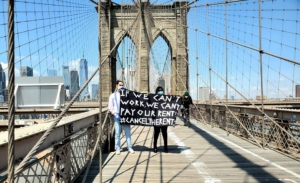
Those without cars stood 6 feet apart on street corners with masks covering their faces holding signs that said “If we can’t work, we can’t pay. Canceltherents.org.” In numerous boroughs of New York City, small groups of protesters dropped banners from overpasses and stood 6 feet apart with homemade signs saying, “Cancel the Rent!”
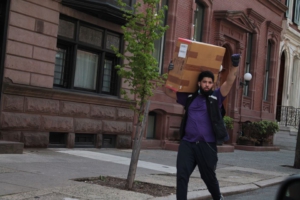
In many cities, like New Haven, Ct. and Denver, pedestrians, essential workers like bus drivers, people living on the street and other drivers responded enthusiastically to the call for for a cancellation of rents, mortgages for workers, small businesses and small landlords. In Boston, some 30 cars drove around the South Bay House of Correction, where many people (most of whom are pretrial) are being jailed. The jail is next to a homeless shelter, and many of the people there were clapping and yelling in support when the caravan passed by. Public bus drivers and individual drivers/pedestrians honked and gestured in support throughout the route.
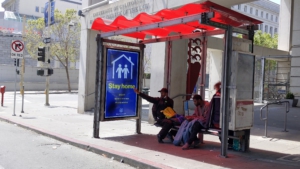
Organizers made it clear that these protests were nothing like the despicable rightwing protests against neccessary stay at home measures. National organizer Brian Becker stated: “While we recognize and society recognize the First Amendment and exercise of First Amendment rights as essential, our April 25, 2020 “Cancel the Rents” car protest will practice the socially responsible regulations outlined in social distancing norms and stay at home orders including physical distancing and mask-wearing. We believe we must act now to defend the essential right of all people to housing during and after the COVID-19 crisis.”
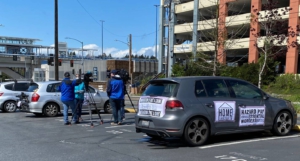
In cities large and small, the message was heard: Cancel the Rents! The protests were picked up by numerous mainstream media outlets including Philadelphia CBS3; Chicago CBS and ABC; WFMZ in Eastern Pennsylvania; Channel 9 in Denver, The Patch in Newark; News 12 in New York; Idaho Press in Boise, NBC in San Francisco and Getty Images, Q-13 and KIRO-7 in Seattle.
Protests in cities large and small
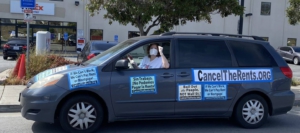
In San Francisco, some 30 cars rolled past rows of sidewalk tents in the Tenderloin as homeless people joined in the chants. The protest started with a speech from Gloria La Riva, the Party for Socialism and Liberation’s 2020 presidential candidate, who pointed out that if the rents stopped being paid, all the housing would still be standing and everyone could have a home.
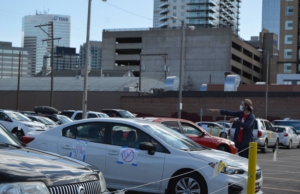
Denver was the site of one of the largest car caravans of the day. Nearly 200 cars met at the Mercury Cafe parking lot and zig-zagged along a one mile circuit through downtown Denver, stopping to honk at several key landmarks of capitalism such as upscale apartments with major vacancies, the State capitol building, the downtown jail and the immigration center, as well as a homeless shelter. The action drew significant media attention and resulted in numerous new “likes” on social media for PSL.
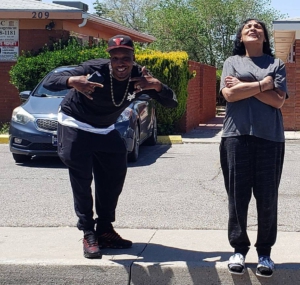
In Albuquerque, 21 cars traveled six miles mostly down Historic Route 66, one of the original U.S. highways. Famous for being the route Dust Bowl refugees used to escape West during the 1930s, it is nowadays entwined into New Mexican low rider car cruising culture. The caravan made several detours into the infamous War Zone neighborhood, known for decrepit, crumbling housing and predatory landlordism. Residents lined the streets cheering. Some ran into the streets shouting their phone numbers and names at passing drivers, asking to be contacted about the next caravan.
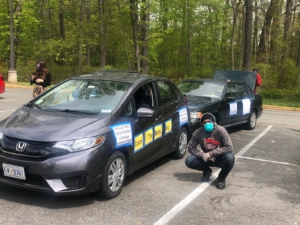
With support from housing rights organizations, decarceration groups, and anti-police terror organizations, the Washington, D.C. caravan was a rousing success, with stops at the mayor’s house, the White House and the DC jail. When the caravan ended at the jail, candidate for DC Council Will Merrifield and PSL organizer Sean Blackmon spoke on the conditions of the prisoners, labor organizer Yasemin Zahra highlighted the power of the people coming together to demand their rights, and ANSWER Coalition National Director Brian Becker and Partnership for Civil Justice Fund Executive Director Mara Verheyden-Hilliard rallied attendees and prisoners in the jail alike to continue being part of our coalition moving forward.
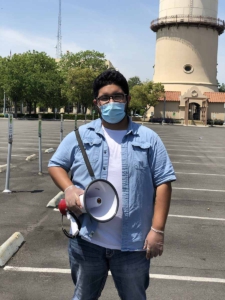
In Fresno Califormia, 13 cars traveled through working class neighborhoods to the Tower District, the main cultural strip in the city and then to downtown where PSL member Cruz Rodriguez gave a speech demanding the cancellation of rents and mortgages for small businesses and homeowners. The caravan was extremely well received, especially in the southeast part of the city. Other drivers honked and pedestrians cheered and waved in support. One vehicle joined the caravan for the majority of the route, waving their hat and cheering. During the entirety of the protest strict social distancing measures were taken and each person participating in the protest that did not have a mask was provided one.
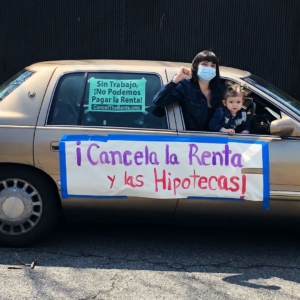
In the New York City metropolitan area, national epicenter of the crisis, protests across the city were met with cheers and support. Two separate caravans rolled through working class areas in Queens, and the Bronx, possibly the hardest hit areas in the country. Caravan drivers decorated their vehicles with signs such as “No Debt During a Pandemic” and “Shouldn’t Choose Rent Over Food.” In northern New Jersey a caravan of some 20 cars passed close to the Essex County Correctional Center to support for the ICE detainees and demand their immediate release. Local news covered the actions as part of a national day of protests. Banner drops were held at strategic and high-traffic locations around the city, such as the Brooklyn Housing Court, Brooklyn Bridge, and the Macombs Dam Bridge in Harlem. Those unable to leave their homes covered their windows with signs of support to inform their neighbors. Outside subway stations, activists chalked up the streets with the demand to cancel the rents.
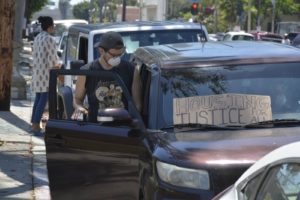
A car caravan with more than 80 cars gathered in Historic South Central Los Angeles and had a press conference before departing to loop through neighborhoods to Downtown LA (passing Section 8 housing, City Hall, the ICE detention center, through Chinatown, ending at the Twin Towers Jail. Endorsing/supporting organizations included: March and Rally Los Angeles, the National Lawyers Guild, Bayan SoCal, Full Rights for Immigrants Coalition, Gabriela, Veterans For Peace – LA, MLK Coalition of Greater Los Angeles, Global Women’s Strike, and Garment Workers Center.
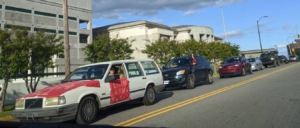
Four protests took place in Pennsylvania: Pittsburgh, Philadelphia, Lancaster and West Chester. In Pittsburgh, cars began a caravan through six Pittsburgh neighborhoods, traveling about 10 miles. With windows down, the caravan waved to passersby as people in cars and pedestrians cheered it on. Approximately 70 cars participated in the Philadelphia action, which circled around City Hall before concluding with several loops around hated local oligarch Joel Freedman’s house. Freedman is a real estate baron who bought a struggling local hospital, closed it down, and then demanded over $5 million from the city to reopen it to treat Coronavirus victims.
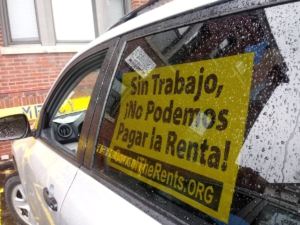
The Midwest was well-represented with protests in Chicago, Minneapolis and Milwaukee and Madison, Wisconsin. The caravan in Chicago was well-attended despite rain, and gained significant media coverage of their press conference.
At least 20 cars drove through Downtown San Diego, through Barrio Logan, to National City. The protest was covered by the San Diego Union Tribune and CBS-8.
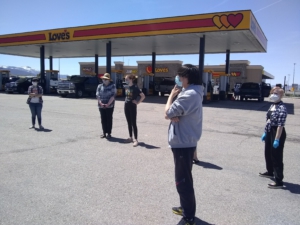
Utah hosted several car protests including in Cedar City and Provo, with 6 and 7 cars respectively. Response was very positive from passersby and a local TV station filmed the Provo action as they embarked on their route.
Car protests took place in over 40 cities including: San Francisco, Los Angeles, Sacramento, San Diego, Fresno (California); Seattle, Spokane, Vancouver and Pasco (Washington state); Salt Lake City, Provo and Cedar Springs (Utah); Dallas and San Antonio, (Texas); Denver, Colorado Springs (Colorado); Milwaukee and Madison, (Wisconsin); Albany and Queens, (New York); Dayton and Cincinatti, (Ohio); Albuquerque, New Mexico; Anchorage, Alaska; Atlanta, Georgia; Boise, Idaho; Boston, Massachusetts; Chicago, Illinois; Columbia, South Carolina;Jackson, Mississipi, Knoxville Tennessee; Manchester, New Hampshire; Minneapolis, Minnesota; Newark, New Jersey. New Haven, Connecticut; Reno, Nevada; and Springfield, Missouri.


